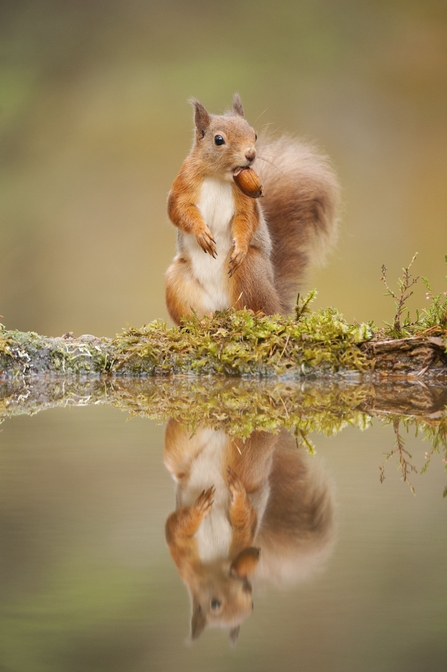All sorts of animals have been seen hiding food away, ready to eat in the depths of winter when other food sources get scarce.
In the woods
Some of the first animals that we might think of when we hear the words ‘winter larder’ are squirrels. These furry mammals hide high-fat food in a scattered fashion, either burying their hoard or stuffing it into hollows in trees. Their stash often includes nutritious meals like acorns and hazelnuts, but red squirrels have also been seen keeping fungi in dry spots between branches to eat later. Squirrels hide so much food in preparation for winter that they inadvertently help woodlands to grow, with many of the forgotten seeds germinating in spring.
Looking to our feathered friends, acorns are also a firm favourite with jays. They cache their food in a similar way to squirrels, scattering it throughout the forest and often forgetting some of the piles. If not buried or hidden well, their stores may be eaten by mice before the jays ever get the chance.
Under the ground
Perhaps more unexpectedly, some British subterranean species also keep food stores in winter. Moles keep stores of earthworms at this time of year, in preparation for the ground freezing and becoming too hard for them to feed. A mole’s storage method is rather gruesome; they bite the heads of worms, immobilising them and then keep their meal in chambers off their tunnels. In areas where flooding is likely the moles might also store their prey in a ‘fortress’ above ground. Some worms have a lucky escape, if they haven’t been eaten by the time the weather warms up, they can heal their heads and tunnel their way out.
Ants are rarely seen in the winter as they retreat underground to wait for spring. They take food below ground with them, including some of the aphids they ‘farm’ the rest of the year. Usually ants protect the aphids from predators in return for the sweet honeydew the aphids produce. If times get tough for the ant colony in winter the aphids may end up as food themselves!
Helping wildlife stock up for winter can be really simple. Putting out food for birds and letting your garden grow wild, with log and rock piles provides food and places for wildlife to wait out the cold.


